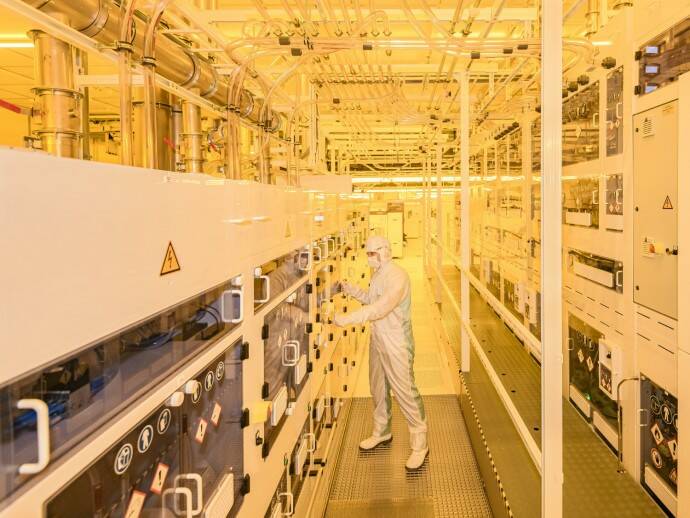TSMC And Pals Chip In For €10B German Fab

What does €5 billion of German taxpayer funding buy you? Certainly not domestic production of TSMC's leading-edge process tech.
For TSMC's foray into European manufacturing, the foundry operator is sticking with mature process tech, namely its 28/22nm planar CMOS and 16nm/12nm FinFET nodes. The joint venture between TSMC, NXP, Infineon, and Bosch, announced on Tuesday, will see the construction of a 300mm-wafer fab outside Dresden, which will produce 40,000 wafers a month.
This means that by the time the factory begins production in 2027, the facility's most advanced process tech will be nearly a decade old. However, because the facility is expected to focus primarily on chips for the automotive and industrial markets, this isn't necessarily a problem as the bulk of purchases in the sector aren't for bleeding-edge silicon.
"Europe is a highly promising place for semiconductor innovation, particularly in the automotive and industrial fields, and we look forward to bringing those innovations to life on our advanced silicon technology with the talent in Europe," TSMC CEO CC Wei said in a statement.
This jointly owned fab is expected to cost €10 billion (£8.6 billion, $11 billion), roughly a third the cost of Intel's Magdeburg mega fab, which comes with a price tag of over €30 billion. That facility is expected to produce chips based on Intel's angstrom-era process tech when the fab comes online in 2027.
- Big chip players join forces to form another RISC-V venture
- The semiconductor biz is sick, but demand for SiC chips that improve EVs is accelerating
- Germany raids climate piggy bank for €20B to bankroll chip fabs
- GlobalFoundries claims German chip subsidies will 'distort competition'
While TSMC will operate the Dresden facility, it will do so under a new entity predictably called the European Semiconductor Manufacturing Co. (ESMC). TSMC will retain 70 percent ownership of the company and the fab while NXP, Infineon, and Bosch will each hold a 10 percent share.
While the German government will front the largest chunk of the cost – the aforementioned five billion euros – TSMC has committed to paying €3.5 billion (£3 billion, $3.8 billion) from its own funds. It appears TSMC's partners are on the hook the remaining €1.5 billion (£1.3 billion, $1.6 billion) not covered by the German government.
In an email to The Register on Tuesday Bosch and NXP semiconductor confirmed they would each contribute €500 million (£430 million, $548 million) to the project. We also reached out to Infineon, and had not heard back at the time of writing.
"The joint venture partners are counting on adequate funding under the framework of the European Chips Act to close the estimated funding gap in accordance with national funding provisions and European State aid rules," a NXP spokesperson told The Register. "No further EU funding details are available at this time."
Berlin has been aggressive in its efforts to attract chipmakers, going so far as to siphon €20 billion (£17 billion, $22 billion) from the country's Climate and Transformation Fund to offset the cost of building fabs.
While Intel was among the first to announce a factory in the country, securing adequate subsidies to offset the extreme cost of building the facilities has been a point of contention with the nation's government. It was only recently that the country reached an agreement with Intel on funding, though the distribution of funds hasn't gone over that well for everyone, with GlobalFoundries expressing frustration that Intel and TSMC will walk away with the bulk of the cash.
Late last month, GlobalFoundries criticized German officials, claiming the subsidies would distort competition.
"There is a real risk of dependence on a single supplier, market foreclosure and less resilient supply chains as a consequence," the US biz's CEO Tom Caulfield was quoted as saying. ®
From Chip War To Cloud War: The Next Frontier In Global Tech Competition
The global chip war, characterized by intense competition among nations and corporations for supremacy in semiconductor ... Read more
The High Stakes Of Tech Regulation: Security Risks And Market Dynamics
The influence of tech giants in the global economy continues to grow, raising crucial questions about how to balance sec... Read more
The Tyranny Of Instagram Interiors: Why It's Time To Break Free From Algorithm-Driven Aesthetics
Instagram has become a dominant force in shaping interior design trends, offering a seemingly endless stream of inspirat... Read more
The Data Crunch In AI: Strategies For Sustainability
Exploring solutions to the imminent exhaustion of internet data for AI training.As the artificial intelligence (AI) indu... Read more
Google Abandons Four-Year Effort To Remove Cookies From Chrome Browser
After four years of dedicated effort, Google has decided to abandon its plan to remove third-party cookies from its Chro... Read more
LinkedIn Embraces AI And Gamification To Drive User Engagement And Revenue
In an effort to tackle slowing revenue growth and enhance user engagement, LinkedIn is turning to artificial intelligenc... Read more

